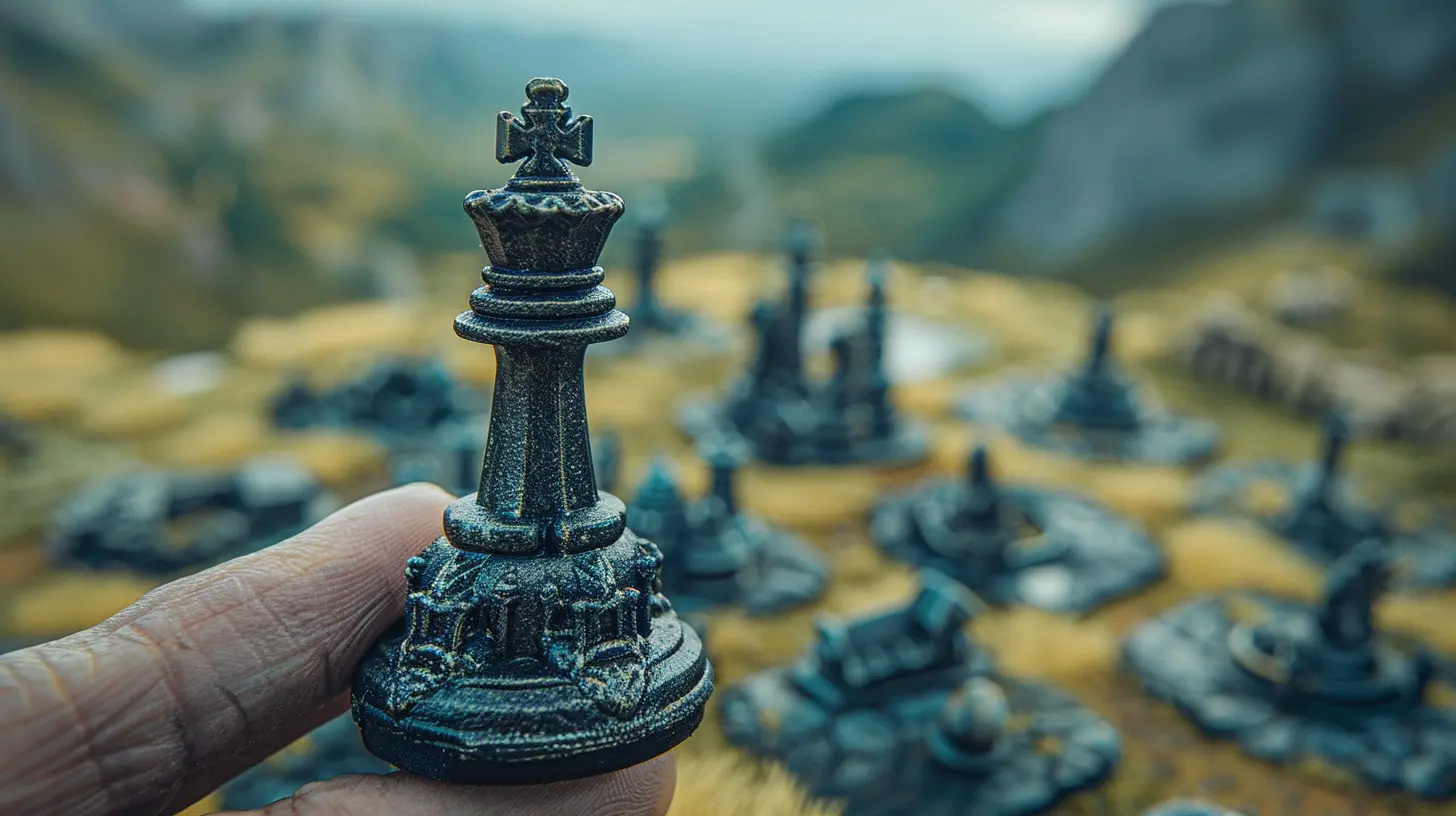The Importance of Patience in Turn-Based Strategy Titles
17 July 2025
When it comes to gaming, there's one genre that really rewards the patient players among us — turn-based strategy (TBS) games. You know the type. Games like XCOM, Civilization, Fire Emblem, or Total War. These aren't your run-and-gun, fast-paced thrill rides. Nope. These are chess-like digital battlegrounds where every single move matters. And if you try to rush through them? Well, expect to get crushed pretty quickly.
In this article, we're going deep into why patience isn't just a helpful trait in turn-based strategy games — it's absolutely essential. Whether you're a seasoned strategist or a rookie commander, embracing patience can completely transform your gameplay. So, sit back, take a breath, and let's talk about what makes patience the unsung hero of turn-based strategy titles.
What Makes Turn-Based Strategy Games Stand Out?
Before we dive into patience, let’s understand what makes TBS games unique. Unlike real-time games, where everything happens at once, turn-based strategy gives you time. Each player takes a turn to move units, build structures, use abilities, and plan forward. Sounds relaxing, right? Eh, not always.That breathing room invites deeper thinking. Every decision can have a chain reaction. It’s not about how fast you react — it’s how smart and deliberate you are. These games reward long-term planning, critical thinking, and yes, patience.
Patience: A Player's Secret Weapon
So why is patience such a big deal with these games? Let’s unpack it.1. Strategy Takes Time — And That’s the Point
You can’t rush genius. In TBS games, throwing your units at the enemy and hoping for the best won’t cut it. You're often managing dozens of variables per turn — your units' position, health, resources, terrain, enemy behavior, and more.Think of these games like a game of chess, except each piece has its own rules. That’s why taking your time isn't just wise — it's necessary. The more time you spend evaluating your options, the better moves you’ll make. A patient player calculates two to three turns ahead. An impatient one rushes in and regrets it after.
2. You Learn More From Failure When You Pause
Here’s a truth bomb for you: you're going to lose. Probably a lot. And that’s okay.Unlike some fast-paced games where you can hit retry and dive right back in, turn-based strategy games hit differently. A single poor decision might not show its consequences until three turns later. If you’re rushing, you’ll miss the lesson. But when you take time to reflect, you get better.
Patience helps you zoom out and ask, “Where did it go wrong?” It’s the difference between rage-quitting and adapting. Seasoned players will tell you: every defeat is a teaching moment, not a failure.
How Patience Enhances Your Tactical Thinking
Now we're getting to the juicy part. Let’s talk tactics and how patience elevates your gameplay.1. Mastering the Art of Delayed Gratification
There's a satisfying kind of tension in TBS games. Sometimes, launching an attack right now feels good — but it's not smart. The patient player waits, maybe even sacrifices short-term wins for a bigger play later.You’re not just reacting; you're composing a symphony of moves. It's like setting a trap and waiting for your opponent to walk into it. That moment when your plan clicks into place three turns later? Absolutely clutch — and 100% worth the wait.
2. Resource Management Over Time
Many TBS titles hinge on resource management — be it gold, energy, action points, or units. Patience plays a huge role here. Spend too quickly, and you’re left exposed. Wait too long, and you fall behind.But a patient player finds the sweet spot, making disciplined decisions that pay off long-term. Think of it like budgeting in real life. Do you blow your whole paycheck on day one? Or do you plan so you don’t end up eating instant noodles for a week?
3. Reading the Opposition
Sometimes it's not your move that matters most — it's predicting your opponent’s. Rushing in can blind you to their intentions. But if you slow down, pay attention, and anticipate their strategy, that’s when you gain the upper hand.Ever watched pro-level strategy matches? Those players are like mind-readers. They act cool, calm, collected — because they’re patient enough to think not just of what they want to do, but what their opponent might do next.
The Mental Benefits of Slowing Down
Here’s something most people don’t think about — turn-based strategy games aren’t just about becoming a better gamer. They’re also fantastic mental workouts. And patience is a major part of that.1. Boosting Focus and Concentration
Quick reflex games demand twitchy fingers. TBS games? They demand your brain. You’ve got to sit down, analyze the situation, and plan methodically. That kind of mental discipline doesn’t just make you a better strategist — it sharpens your focus in everyday life, too.Learning to slow your thoughts, resist impulsive decisions, and weigh outcomes pays off in more ways than you think.
2. Stress Reduction Through Control
These games move at your pace. You don’t have to panic or feel pressured. You’re in control. And when you’re patient, you take that power and use it wisely.Instead of raging or rushing, you breathe. You take your time. And in a weird way — even when it's war on-screen — it's kind of calming, isn't it?
Common Pitfalls of Impatient Play
Let’s be honest. We’ve all made dumb moves because we got impatient. “Just one more turn” turns into a disaster. Here’s what happens when patience goes out the window.1. Tunnel Vision
You focus too hard on one goal and ignore the bigger picture. You might take a city only to realize you overextended yourself. Oops.2. Overconfidence
“That move worked once, it'll work again!” Not always. TBS games are dynamic. Strategies need to evolve. Patience lets you reassess constantly.3. Emotional Decision-Making
Ever lost a key unit and counterattacked out of pure anger? That’s your impatience talking. Cool heads win wars. Hot heads get wiped out.How to Build Patience in Turn-Based Games
Okay, so patience is important. But how do you build it if you're not naturally patient? Good news — it’s a skill, not a personality trait. Here are some tips.1. Play with a Purpose
Don’t just mash buttons. Play deliberately. Ask yourself at each turn: “Why am I doing this?” If you can’t answer, slow down.2. Let Yourself Take Breaks
If you’re getting frustrated, step away. Think it through over a cup of coffee or during a walk. Some of the best decisions come when you’re NOT staring at the screen.3. Watch Others
There’s a ton of YouTube channels and Twitch streams focused on TBS games. Watching experienced players can show you how they take their time, analyze their moves, and avoid rushing.4. Reflect Post-Game
Win or lose, ask yourself: “Where did I wait? Where did I rush?” This kind of review builds awareness and helps your patience grow.Final Thoughts: Patience Doesn’t Slow You Down — It Speeds You Up (Eventually)
We often think of patience as the opposite of action, like sitting still while the world passes by. But in turn-based strategy games, patience is action. It’s strategic stillness. It’s playing the long game, setting traps, keeping calm, and sharpening your mind.It might feel slow at first. But over time? It makes you faster — not with your hands, but with your head. You’ll see better plays, avoid costly mistakes, and eventually dominate the battlefield like a true tactician.
So the next time you're tempted to click “end turn” too fast, pause. Take a deep breath. Your future self (and your digital army) will thank you.
all images in this post were generated using AI tools
Category:
Game StrategiesAuthor:

Jack McKinstry
Discussion
rate this article
2 comments
Upton Hensley
Absolutely! Patience makes every move feel more rewarding!
December 5, 2025 at 4:04 PM

Jack McKinstry
Thank you! Patience truly enhances the depth and enjoyment of strategy games.
Ronan McCracken
This article beautifully highlights the essential role of patience in turn-based strategy games. It's a reminder that, much like in life, taking our time can lead to more thoughtful decisions and deeper enjoyment. Embracing a slower pace can truly enhance our gaming experiences. Thank you for sharing this insight!
July 31, 2025 at 2:57 PM

Jack McKinstry
Thank you for your thoughtful comment! I’m glad you found the article resonates with both gaming and life. Patience truly enriches our experiences!


